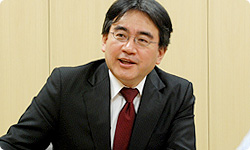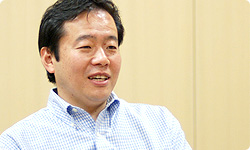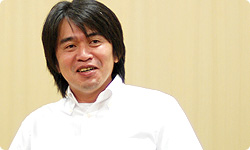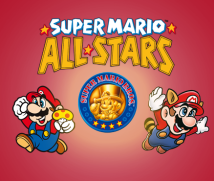2. First Encounters with Super Mario
The original Super Mario came out before any of you were working for Nintendo. Eguchi-san, did you play Mario during your student days?
Actually... No. When I joined the company, I started living in company housing. I went to a colleague’s room to hang out and he had a Famicom. That was my first time to play one.
Huh? You entered Nintendo the year after Super Mario came out, but you didn’t know about the Famicom?
Well, I sort of knew such a thing existed, but... (laughs) I had played Game & Watch during my junior high days, though.
So you did know we were a company involved with video games.
Yeah. And I knew Nintendo’s name as a sponsor of television programs, so I thought, “Hmm, I guess they’re a proper company.”
(laughs) Well, in 1986, the speed at which information spread was much slower than it is today.
There was no Internet.
The Famicom went on sale in 1983, but it didn’t really gain acceptance from the general public until about 1986. Likewise, some time passed after the release of Super Mario before the world took much notice of it. Nowadays, when an eagerly awaited game console or video game goes on sale, long lines form outside stores, but this was before that ever happened.

That’s right.
How about you Konno-san?
Unlike Eguchi-san, I played Super Mario all the time. I had always liked the Donkey Kong arcade game .19 I’d put in money and play for hours. When I heard I could play that on the Famicom, I was shocked. 19Donkey Kong: An arcade action game that appeared in 1981. The Famicom version was released simultaneously with the console in July 1983 in Japan.
You could play as much as you wanted at home without having to put in one hundred yen.
That’s right. And the suggested retail price of a Famicom was only 14,800 yen. Back then, I was messing around with microcomputers and personal computers at school that cost 300,000 or 400,000 yen, and the Famicom was an equal or better machine.
Yeah. At least when it came to playing games, it was definitely better.
It was now possible to use something better in my own home. I wanted to buy a Famicom, so I talked to my teacher at school.
Why did you talk to your teacher?
I belonged to something like a computer club. When the Famicom came out, our teacher told me to go check it out, and I went to a big supermarket. It was marked down a little to 12,800 yen, but for some reason I had the idea that the original price of a Famicom was 128,000 yen! (laughs)
That much?!
At school I’d been using machines that cost 400,000 to 500,000 yen, so I thought it was only normal that computers cost hundreds of thousands of yen.
(laughs)
I went straight back to school and told my teacher they were selling it at a huge discount. We decided to buy one, and when we did and I examined it, I realised how high performance it was.
Even when it came to home video game consoles back then, the Famicom was outstanding in both price and performance.
That’s right. It really was. I was shocked at how a machine that allowed you to play Donkey Kong was on sale for a little over 10,000 yen. Later on, I bought my own Famicom. Back then, the buttons were square .
The early model.
Yeah. I was really proud of it! (laughs) Then Super Mario came along and I bought it right away. It scrolled on and on sideways, bringing a thrill that hadn’t existed in Famicom games up until then.

It felt like the game world just kept on opening up.
Yeah. I was truly amazed.
Kimura-san, did you play Mario before coming to Nintendo?
Yeah. I was in university during the Famicom boom. One day, my big sister bought Super Mario together with a Famicom. I was already familiar with Mario from the Mario Bros. arcade game .20 20Mario Bros.: An action game that appeared in arcades in 1983 and was released later the same year in September for the Famicom system.
Oh, you played Mario Bros. at game centres before the Famicom version came out?
Yeah. I thought Super Mario would be the same kind of game, but when I played it I was surprised - as Konno-san mentioned earlier - how as it scrolled sideways new land forms and enemies kept appearing, and I got totally absorbed in it. At the time, though, I wasn’t very good at action games, so I remember continually repeating Worlds 1-1 and 1-2.
You couldn’t move beyond that.
No. I couldn’t play it through to the end.
I see. It’s funny how someone who once had to keep repeating Worlds 1-1 and 1-2 became the producer of New Mario! (laughs)
Yeah. (laughs)
Koizumi-san, you were a high school student, weren’t you, when Super Mario came out?
Yeah.
Did you play Super Mario?
No, I knew about the Famicom and my friends were really into it, but I was more into movies and hardly had any opportunities to play the Famicom. In university, I had the chance to play The Lost Levels21 on the Disk System, but it was too hard and I thought, “There’s no way I can do this...” 21Super Mario Bros.: The Lost Levels: An action game released for the Famicom Disk System in June 1986 in Japan.
Your first encounter with Mario was in The Lost Levels?
Yeah. I jumped right into The Lost Levels.
That’s crazy! (laughs)
(laughs)
When I heard how popular Super Mario was and tried it out, I thought, “But it’s so difficult!” (laughs)

Anyone who started with The Lost Levels would get that impression. I mean, it was made to be an advanced version of Super Mario.
There was no way I could beat it, so I bought and played The Legend of Zelda 22 instead. 22The Legend of Zelda: An action-adventure game released simultaneously with the Famicom Disk System in February 1986 in Japan.
(laughs) By the way, Kimura-san, have you beat Super Mario since joining Nintendo?
Thankfully, yes! (laughs) In college, I loved RPGs and beat some, but Mario is an action game, so unlike RPGs, you can’t really move forward simply by putting in time to build up experience and get stronger. So I was super happy when I applied myself and cleared it.
In the case of arcade games, there basically weren’t any action games that had an end.
Yeah, the more you improved, the longer you could keep playing.
It was about seeing how far you could get while your determination and stamina held up. I was part of that arcade generation, too, so I wasn’t expecting action games for home consoles to have an ending. Then when I was playing Super Mario and at the very end of it the words “Thank you, Mario!” appeared, I was like, “Say what? Did it just end?”
(laughs)
That was a surprise back then.
